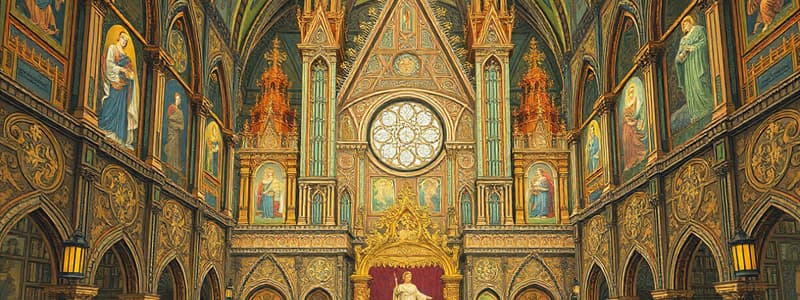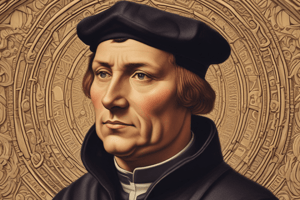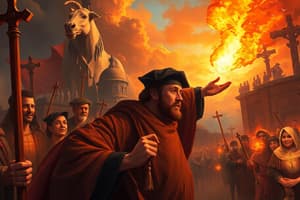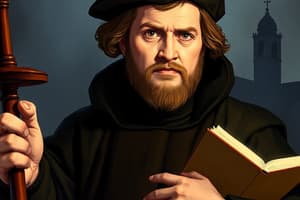Podcast
Questions and Answers
What was a common criticism of the Catholic Church in the period leading up to the Protestant Reformation?
What was a common criticism of the Catholic Church in the period leading up to the Protestant Reformation?
- The excessive secrecy in Church operations
- The Church's commitment to poverty and humility
- The Church's emphasis on scriptural fidelity
- The sale of indulgences and corrupt practices (correct)
Which reformer is known for advocating the translation of the Bible into English?
Which reformer is known for advocating the translation of the Bible into English?
- Savonarola
- Jan Hus
- Erasmus
- John Wycliffe (correct)
What significant stance did Jan Hus take against the Catholic Church?
What significant stance did Jan Hus take against the Catholic Church?
- He endorsed papal authority
- He supported clerical celibacy
- He opposed the sale of indulgences (correct)
- He approved of indulgences
What did Erasmus advocate for in relation to religion?
What did Erasmus advocate for in relation to religion?
What was the attitude towards papal authority during the pre-Reformation period?
What was the attitude towards papal authority during the pre-Reformation period?
Which reformer's execution was a notable event in the criticism of the Catholic Church?
Which reformer's execution was a notable event in the criticism of the Catholic Church?
What aspect of clerical celibacy was criticized during this period?
What aspect of clerical celibacy was criticized during this period?
What main factor contributed to the perception of corruption within the Catholic Church?
What main factor contributed to the perception of corruption within the Catholic Church?
Which of the following is a characteristic of Mannerism?
Which of the following is a characteristic of Mannerism?
What defines the Baroque style in art?
What defines the Baroque style in art?
Which artist is NOT associated with the Mannerist style?
Which artist is NOT associated with the Mannerist style?
What was a key factor that contributed to the Protestant Reformation?
What was a key factor that contributed to the Protestant Reformation?
Which of the following is a defining feature of Baroque art?
Which of the following is a defining feature of Baroque art?
Who is known as the pioneer of the Baroque style?
Who is known as the pioneer of the Baroque style?
The elongated figures in Mannerism are often associated with which artist?
The elongated figures in Mannerism are often associated with which artist?
Which of the following trends did NOT contribute to the upheaval during the Reformation?
Which of the following trends did NOT contribute to the upheaval during the Reformation?
Which artist is best associated with the use of chiaroscuro in Baroque art?
Which artist is best associated with the use of chiaroscuro in Baroque art?
Which of the following describes the impact of the wars of religion on local economies?
Which of the following describes the impact of the wars of religion on local economies?
What was a major outcome of the Peace of Westphalia in 1648?
What was a major outcome of the Peace of Westphalia in 1648?
Which state is known for using the Reformation to establish its own national church?
Which state is known for using the Reformation to establish its own national church?
What was the primary focus of the Catholic Reformation?
What was the primary focus of the Catholic Reformation?
Which key event marked the Catholic Reformation and was convened by Pope Paul III?
Which key event marked the Catholic Reformation and was convened by Pope Paul III?
What was a significant impact of the Council of Trent?
What was a significant impact of the Council of Trent?
How did the printing press contribute to the Protestant Reformation?
How did the printing press contribute to the Protestant Reformation?
What was the primary role of the clergy in 16th-century society?
What was the primary role of the clergy in 16th-century society?
Which class was primarily responsible for local governance and held privileges in society?
Which class was primarily responsible for local governance and held privileges in society?
What role did women predominantly have in 16th-century society?
What role did women predominantly have in 16th-century society?
Which leisure activity was popular among the nobility during this period?
Which leisure activity was popular among the nobility during this period?
What characterized the Mannerism artistic style?
What characterized the Mannerism artistic style?
Which figure is associated with founding the Society of Jesus during the Catholic Reformation?
Which figure is associated with founding the Society of Jesus during the Catholic Reformation?
What was a significant impact of the Catholic Reformation on the Catholic Church?
What was a significant impact of the Catholic Reformation on the Catholic Church?
What is the primary basis for a person being declared righteous before God in Protestant belief?
What is the primary basis for a person being declared righteous before God in Protestant belief?
Which of the following sacraments is recognized by Protestants?
Which of the following sacraments is recognized by Protestants?
What concept significantly challenged the authority of the Catholic Church during the Reformation?
What concept significantly challenged the authority of the Catholic Church during the Reformation?
What was one result of the establishment of state churches in Protestant countries?
What was one result of the establishment of state churches in Protestant countries?
Which of the following groups rejected infant baptism?
Which of the following groups rejected infant baptism?
What was the significant outcome of the Peace of Augsburg in 1555?
What was the significant outcome of the Peace of Augsburg in 1555?
The French Wars of Religion primarily arose due to conflicts between which two groups?
The French Wars of Religion primarily arose due to conflicts between which two groups?
What event marked the beginning of the French Wars of Religion?
What event marked the beginning of the French Wars of Religion?
The Thirty Years' War was characterized by its destruction primarily on which population?
The Thirty Years' War was characterized by its destruction primarily on which population?
Which group fought for their rights during the Protestant Reformation while opposing both the church and state?
Which group fought for their rights during the Protestant Reformation while opposing both the church and state?
Which war was triggered by Emperor Charles V's attempts to enforce Catholicism?
Which war was triggered by Emperor Charles V's attempts to enforce Catholicism?
What was the significance of the St. Bartholomew's Day Massacre?
What was the significance of the St. Bartholomew's Day Massacre?
The concept of 'priesthood of all believers' implies what in Protestant tradition?
The concept of 'priesthood of all believers' implies what in Protestant tradition?
What was a significant consequence of the sale of church offices during the Reformation?
What was a significant consequence of the sale of church offices during the Reformation?
How did the use of Latin in church services affect ordinary people?
How did the use of Latin in church services affect ordinary people?
Which economic change was catalyzed by the Protestant Reformation?
Which economic change was catalyzed by the Protestant Reformation?
What political development accompanied the emergence of nation-states during the Age of Reformations?
What political development accompanied the emergence of nation-states during the Age of Reformations?
What was a key belief of Protestantism as established during the Reformation?
What was a key belief of Protestantism as established during the Reformation?
What doctrine did John Calvin strongly promote?
What doctrine did John Calvin strongly promote?
What role did the Enlightenment have in relation to the political developments of the Age of Reformations?
What role did the Enlightenment have in relation to the political developments of the Age of Reformations?
Which significant war was a result of the religious conflicts during the Reformation?
Which significant war was a result of the religious conflicts during the Reformation?
What was one economic effect of colonialism during the Age of Reformations?
What was one economic effect of colonialism during the Age of Reformations?
Martin Luther's '95 Theses' primarily addressed concerns regarding which practice?
Martin Luther's '95 Theses' primarily addressed concerns regarding which practice?
What was a major consequence of the Peace of Westphalia?
What was a major consequence of the Peace of Westphalia?
Which technological advancement is associated with the growth of industries during the Age of Reformations?
Which technological advancement is associated with the growth of industries during the Age of Reformations?
What did Luther do to make the Bible more accessible to the common people?
What did Luther do to make the Bible more accessible to the common people?
How did Protestant beliefs regarding salvation differ from those of the Catholic Church?
How did Protestant beliefs regarding salvation differ from those of the Catholic Church?
Flashcards
Who was John Wycliffe?
Who was John Wycliffe?
An English theologian who lived in the 14th century and advocated for translating the Bible into English so ordinary people could read it. He also criticized the Catholic Church's wealth and corruption.
Who was Jan Hus?
Who was Jan Hus?
A Czech theologian and reformer who lived in the 15th century known for criticizing the Catholic Church's sale of indulgences and its corruption. He also advocated for using vernacular languages in religious services.
Who was Erasmus?
Who was Erasmus?
A Dutch humanist and theologian of the 15th and 16th centuries known for criticizing the Catholic Church's corruption and calling for reform. He also advocated for studying classical texts and using reason in religion.
Who was Savonarola?
Who was Savonarola?
Signup and view all the flashcards
What was the perception of corruption in the Catholic Church during the Late Middle Ages?
What was the perception of corruption in the Catholic Church during the Late Middle Ages?
Signup and view all the flashcards
What criticism was levied against clerical celibacy during the Late Middle Ages?
What criticism was levied against clerical celibacy during the Late Middle Ages?
Signup and view all the flashcards
What concerns were raised about papal authority during the Late Middle Ages?
What concerns were raised about papal authority during the Late Middle Ages?
Signup and view all the flashcards
Explain what the 'sale of indulgences' was and why it was criticized.
Explain what the 'sale of indulgences' was and why it was criticized.
Signup and view all the flashcards
Sale of Church Offices
Sale of Church Offices
Signup and view all the flashcards
Latin in Church Services
Latin in Church Services
Signup and view all the flashcards
Age of Reformations
Age of Reformations
Signup and view all the flashcards
Economic Developments in the Age of Reformations
Economic Developments in the Age of Reformations
Signup and view all the flashcards
Rise of Nation-States
Rise of Nation-States
Signup and view all the flashcards
Religious Conflicts
Religious Conflicts
Signup and view all the flashcards
Absolutism
Absolutism
Signup and view all the flashcards
Colonialism
Colonialism
Signup and view all the flashcards
Enlightenment
Enlightenment
Signup and view all the flashcards
Martin Luther
Martin Luther
Signup and view all the flashcards
John Calvin
John Calvin
Signup and view all the flashcards
Protestant Beliefs
Protestant Beliefs
Signup and view all the flashcards
Sale of Indulgences
Sale of Indulgences
Signup and view all the flashcards
95 Theses
95 Theses
Signup and view all the flashcards
Institutes of the Christian Religion
Institutes of the Christian Religion
Signup and view all the flashcards
Priesthood of all believers
Priesthood of all believers
Signup and view all the flashcards
State Church
State Church
Signup and view all the flashcards
Huguenots
Huguenots
Signup and view all the flashcards
Anabaptists
Anabaptists
Signup and view all the flashcards
Radical Reformers
Radical Reformers
Signup and view all the flashcards
Peasants in the Reformation
Peasants in the Reformation
Signup and view all the flashcards
Protestant Dissenters
Protestant Dissenters
Signup and view all the flashcards
Waldensians
Waldensians
Signup and view all the flashcards
German Peasants' War
German Peasants' War
Signup and view all the flashcards
Schmalkaldic Wars
Schmalkaldic Wars
Signup and view all the flashcards
Peace of Augsburg
Peace of Augsburg
Signup and view all the flashcards
French Wars of Religion
French Wars of Religion
Signup and view all the flashcards
Massacre of Vassy
Massacre of Vassy
Signup and view all the flashcards
St. Bartholomew's Day Massacre
St. Bartholomew's Day Massacre
Signup and view all the flashcards
The Thirty Years' War
The Thirty Years' War
Signup and view all the flashcards
What was the Catholic Reformation?
What was the Catholic Reformation?
Signup and view all the flashcards
How did the printing press influence the Catholic Reformation?
How did the printing press influence the Catholic Reformation?
Signup and view all the flashcards
Who was Pope Paul III and what was his role in the Catholic Reformation?
Who was Pope Paul III and what was his role in the Catholic Reformation?
Signup and view all the flashcards
Who was St. Ignatius of Loyola and how did he contribute to the Catholic Reformation?
Who was St. Ignatius of Loyola and how did he contribute to the Catholic Reformation?
Signup and view all the flashcards
Who was St. Teresa of Avila and what was her role in the Catholic Reformation?
Who was St. Teresa of Avila and what was her role in the Catholic Reformation?
Signup and view all the flashcards
What was the Council of Trent and what were some of its outcomes?
What was the Council of Trent and what were some of its outcomes?
Signup and view all the flashcards
What was the Society of Jesus and how did they impact the Catholic Reformation?
What was the Society of Jesus and how did they impact the Catholic Reformation?
Signup and view all the flashcards
What were the key reforms made by St. Teresa of Avila?
What were the key reforms made by St. Teresa of Avila?
Signup and view all the flashcards
What were some of the impacts of the Catholic Reformation?
What were some of the impacts of the Catholic Reformation?
Signup and view all the flashcards
What is the Baroque period?
What is the Baroque period?
Signup and view all the flashcards
Who were the nobility and what were their roles in 16th-century Europe?
Who were the nobility and what were their roles in 16th-century Europe?
Signup and view all the flashcards
Describe the role of the clergy in 16th-century Europe.
Describe the role of the clergy in 16th-century Europe.
Signup and view all the flashcards
Who were the bourgeoisie and what characterized their role in 16th-century Europe?
Who were the bourgeoisie and what characterized their role in 16th-century Europe?
Signup and view all the flashcards
Who were the peasants and what was their role in 16th-century Europe?
Who were the peasants and what was their role in 16th-century Europe?
Signup and view all the flashcards
Describe the status of women in 16th-century Europe.
Describe the status of women in 16th-century Europe.
Signup and view all the flashcards
Mannerism
Mannerism
Signup and view all the flashcards
Caravaggio
Caravaggio
Signup and view all the flashcards
El Greco
El Greco
Signup and view all the flashcards
Jacopo da Pontormo
Jacopo da Pontormo
Signup and view all the flashcards
Rosso Fiorentino
Rosso Fiorentino
Signup and view all the flashcards
Parmigianino
Parmigianino
Signup and view all the flashcards
Baroque Art
Baroque Art
Signup and view all the flashcards
Gian Lorenzo Bernini
Gian Lorenzo Bernini
Signup and view all the flashcards
Peter Paul Rubens
Peter Paul Rubens
Signup and view all the flashcards
Rembrandt van Rijn
Rembrandt van Rijn
Signup and view all the flashcards
Study Notes
16th and 17th-Century Challenges and Developments
- Pre-Luther Reformers challenged Catholic Church authority
- Many reformers sought to improve Church practices, including Bible translation and challenging practices like indulgences.
- John Wycliffe (14th century) translated the Bible into English and criticized Church corruption.
- Jan Hus (15th century) condemned indulgences and advocated vernacular services, was executed for heresy.
- Erasmus (15th-16th centuries) critiqued corruption and advocated reason in religion.
- Savonarola (late 15th century) sought a simpler, more moral Christianity, was executed for heresy.
- Corruption in the Catholic Church was a major concern regarding wealth accumulation and abuse of power.
- Indulgences, Clerical celibacy, Papal authority, and the sale of church offices were criticized for their corruption.
- The use of Latin in Church services alienated many people.
- International trade and the rise of capitalism led to economic changes in this era.
- The Protestant Reformation impacted these economic transformations by challenging the Church's control over economic matters.
- New banking systems and industries (textiles, mining, shipbuilding) developed.
- Colonialism played a role in the economic development of Europe.
- The Age of Reformations saw the rise of nation-states, shifting power from the Church.
- Religious conflicts (e.g., the Thirty Years' War) led to significant political changes and state sovereignty.
- Absolutism, where monarchs held absolute power, emerged.
- Colonial expansion was another significant political aspect of this time.
- The Enlightenment, beginning in the late 17th century, challenged traditional structures and advocated individual rights and democracy.
- The transition of power from Church to state was consequential.
Luther and the Protestant Reformation
- Martin Luther (16th century) sparked the Protestant Reformation with the 95 Theses in 1517.
- Luther criticized Church practices, emphasizing faith and the Bible.
- He translated the Bible into German and his ideas spread widely.
- John Calvin (1509-1564) was a pivotal figure who developed influential Protestant theology.
- His work, Institutes of the Christian Religion, outlined key Protestant beliefs.
- Calvin's doctrine of predestination is a significant aspect of his theological impact.
- Calvin established a theocratic government in Geneva.
Protestant Beliefs
- Protestantism developed from the 16th-century Reformation.
- Core Protestant beliefs include Sola Scriptura (Bible as sole authority), Sola Fide (salvation through faith alone), Sola Gratia (salvation by grace alone), priesthood of all believers, justification by faith (righteousness declared by God based on faith in Christ).
- Protestants recognize baptism and the Lord's Supper (Communion) as sacraments.
- They reject a separate priestly class, emphasizing all Christians' roles as ministers.
- Protestants view the Church as the body of believers, rather than a specific institution.
- A belief in Jesus' second coming is a core element.
Protestant Reform Continues
- The Reformation's "priesthood of all believers" concept shifted power from the Church to the state.
- State churches, such as the Church of England, emerged.
- State control over the Church led to conflicts.
- Religious dissenters faced persecution.
- Groups that opposed the state included Anabaptists (adult baptism, separation of church and state), Radical Reformers (direct guidance of the Holy Spirit), Peasants (fought for better rights), Protestant Dissenters (disagreed with established doctrine), and the Waldensians (rejected Catholic Church authority).
Wars of Religion
- German conflicts included the German Peasants' War (1524-1525), Schmalkaldic Wars (1546-1547), and the Peace of Augsburg (1555).
- The Schmalkaldic Wars resulted from the Holy Roman Empire's attempt to force Catholicism.
- The Peace of Augsburg introduced the principle of “cuius regio, eius religio.”
- The French Wars of Religion (1562-1598) were conflicts between Catholics and Huguenots.
- Key events included the Massacre of Vassy (1562) and the St. Bartholomew's Day Massacre (1572).
- The Thirty Years' War (1618-1648), a major European conflict, involved various powers.
- The Peace of Westphalia (1648) ended the Thirty Years' War.
- States often manipulated religious conflict to achieve political goals.
The Catholic Reformation
- The Catholic Reformation (Counter-Reformation) responded to the Protestant Reformation.
- Causes included the Protestant challenge and the spread of Protestant ideas.
- Key figures included Pope Paul III (Council of Trent), St. Ignatius of Loyola (Jesuits), and St. Teresa of Avila (Carmelite reforms).
- The Council of Trent addressed Church criticisms and reaffirmed doctrines.
- The Society of Jesus (Jesuits) reformed missions and education.
- The Catholic Reformation contributed to a spiritual and artistic renewal.
16th-Century Society & Politics
- Social hierarchy comprised nobility (land ownership, political power), clergy (religious duties), bourgeoisie (merchants), and peasants (laborers).
- Communities were local and centered around the church and ruling class.
- Leisure activities involved community festivals, fairs, and sports.
Mannerism and Baroque Art
- Mannerism (late Renaissance) emphasized distortion, exaggerated poses, and artificial color.
- Baroque art (17th century) featured drama, grandeur, intense emotions, and the use of light and shadow (chiaroscuro).
- Important Mannerist artists include Michelangelo Merisi da Caravaggio (precursor to Baroque, chiaroscuro), El Greco, Jacopo da Pontormo, Rosso Fiorentino, and Parmigianino.
- Baroque artists included Gian Lorenzo Bernini, Peter Paul Rubens, Rembrandt van Rijn, Diego Velázquez, and Caravaggio (Baroque painter).
Causation in the Age of Reformation & Wars of Religion
- Religious factors played a crucial role, leading to religious conflicts.
- Political factors, including the rise of nation-states and monarchs' ambition, were entwined with religious conflicts.
- Social and economic factors, like humanism's impact and the growth of commerce, significantly shaped the period.
Studying That Suits You
Use AI to generate personalized quizzes and flashcards to suit your learning preferences.





